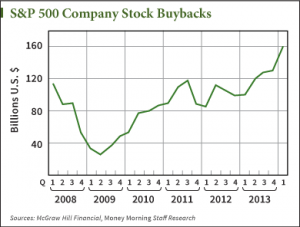 U.S. firms have used record cash piles to buy back more shares than ever before - but are stock buybacks really good for investors?
U.S. firms have used record cash piles to buy back more shares than ever before - but are stock buybacks really good for investors?
The first quarter's year-over-year increase in stock buybacks was one of the largest in recent history. The quarter's total was also the third-largest since 2005, according to data from FactSet.
The pace slowed in Q2 by 22.9% - but only because the growth was nearly impossible to maintain.
The increase is so much so that buyback activity is nearing levels it hasn't seen since before the financial crisis.
"The share buybacks show a level of optimism at the corporate level," Michael Amenta, a research analyst at FactSet, told Money Morning. "Unfortunately, they were optimistic in 2007, so they're not always right."
But it's important to look beyond the numbers with stock buybacks. Sometimes they are used to make a company's stock appear better than it really is.
To find out if 2014's stock buyback activity is healthy, it's important to understand why a company buys back its own shares - and how to tell when it's not a good thing...
Why Companies Buy Back Their Own Shares
Companies can give back to shareholders in two principal ways: dividends and share buybacks.
A dividend provides a steady payment to shareholders out of the company's coffers, subject to U.S. tax laws.
Stock buybacks reduce the total number of shares outstanding, driving up stock prices. Shareholders will see the stock appreciate in value, but won't be subject to any U.S. taxes until they sell off and have to pay a tax on capital gains.
In effect, a stock buyback is a way to create shareholder value by reducing supply on the market.
But it doesn't always work that way...
You see, the best time for a company to buy back its own stock is when the shares are trading below their intrinsic value.
There are many ways to determine a company's intrinsic value. A typical Finance 101 method is the net present value calculation, although there are several measures.
If, after that calculation, a company determines they are trading below intrinsic value, they would be wise to start buying back shares.
"You want to buy back at a relatively low price, not when a stock is hitting all-time highs," David Kass, a finance professor at the University of Maryland's Robert H. Smith School of Business, told Money Morning.
The trouble is when companies initiate share repurchases when they are already overvalued.
In this case, companies are overpaying for their own shares. They are also overinflating stock prices and forcing shareholders to hold an overvalued asset. This means it will likely dive once the broader market catches on to the company's true value.
"If you are to buy back shares at prices above intrinsic value you're probably destroying shareholder value," Kass said. "You're doing more harm to your company than good."
For example, in the second quarter this year, Whole Foods Market Inc. (Nasdaq: WFM) repurchased $603 million in shares, or 4.2% of its market cap, according to Fortuna Advisors analysis. On the quarter, WFM stock fell from $50.71 a share to $38.69, or 23.7%.
So is this accelerated buyback activity doing more harm to the markets than good?
What Stock Buybacks Mean for the Market
FactSet's Amenta doesn't think so. This year is much different than the stock buybacks of the pre-recession bubble times.
"It's certainly trending upwards and it's nearing those pre-recession highs, but this is different," Amenta said.
Cash flow is much steadier now than it was during the bubble.
Now buybacks comprise 82% of companies' free cash flow, whereas in the second quarter of 2007, it was a dizzying 853% just before the bubble burst, according to FactSet data.
Kass said he thinks current valuations in the market are more reasonable than they were pre-financial crisis.
"I view current stock valuations near the higher end of a normal range," Kass said, "Whereas pre-financial crisis valuation levels were much higher."
Most recent estimates of the price-to-earnings ratio for the S&P 500 have the figure at 18.23, with the S&P predicting that to drop to 14.71 in the next year. Compare that to the onset of the financial crisis, when the P/E ratio was at 22.19 in the fourth quarter of 2007.
"I think [stock buybacks] make more sense now," Kass said. "I don't think there's a bubble."
More on stock buybacks: While oftentimes touted as good for investors, here's how stock buybacks can mislead potential investors...
Related Articles:
- FactSet: Buyback Quarterly


